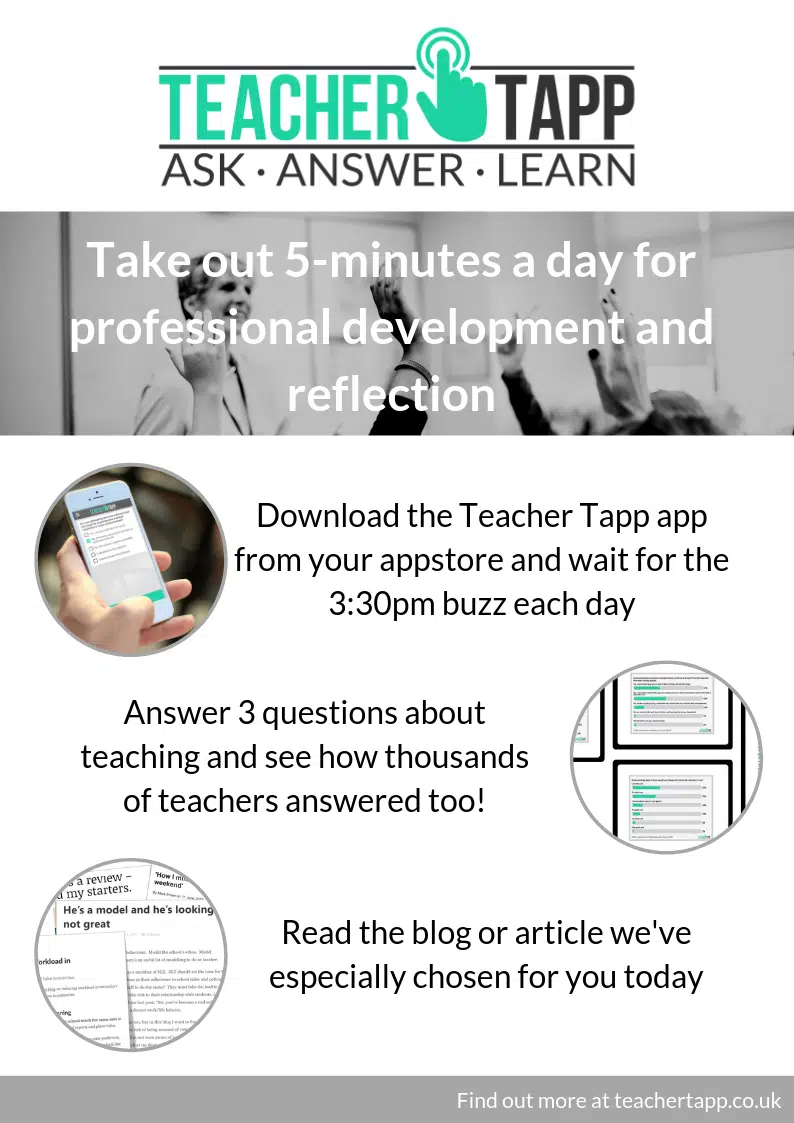1. Biggest shock of the week?
We are always happy when Teacher Tapp results prove us wrong.
At the NAHT conference, we heard stories of children finding foreign languages so stressful that they are being medically signed off from the classes. Becky didn’t think this sounded like a common occurrence, but we found that 16% of you reported having had this happen at your school.
Some teachers on social media were still sceptical and suggested that we check whether heads and language teachers also reported high levels of students being signed-off as they would be more likely to do. Guess what? They do! Actually, 21% of heads (shown below) and 23% of language teachers say this has happened at their school.

You may not like or believe the evidence, but the data suggests that something really is going on.
2. How much are you learning?
How much professional learning does the average teacher do in a term? Given we spend a lot of time helping children to learn, this question matters because it shows how you are incrementally improving your own skills.
One in three teachers has weekly professional development during term time. For example, through a weekly training session. That’s a lot!
Only 10% of teachers get CPD solely on INSET days.

So, which teachers are getting the best learning experience and why?
It’s clear that private schools are lagging the pack here. Around half (47%) said you get professional development sessions less than once a half term. On the other hand, those of you working in schools serving the most disadvantaged communities get the richest CPD experience. What could explain these patterns?

One theory is that it’s easier to lay on multi-school CPD in more urban areas. There is a hint of evidence for this: London and the South East get a good deal when it comes to CPD provision.

Another thought was that it related to years of experience, as new teachers are often required to do weekly training, and there are more new teachers in London. But, nope! Years of experience didn’t make much difference either.
Your guess is therefore as good as ours!
3. The Rosenshine Craze
The Rosenshine principles are a series of 10 evidence-based strategies for designing effective lessons. The final page of Teacher Tapp has delivered a whole series of tips about this topic and they are often very popular.
But have we been effective in ensuring you know about this latest idea? Maybe not! 59% of you have still never heard of the principles.

Secondary teachers were much more likely to have heard of the strategies. Perhaps this is no surprise – as it’s a harder to imagine a Reception class run along the principles of the paper!

It is every easy for people to say they know the principles. But do you really?
We set up a little test….
And yes! Those of you who said you knew Rosenshine generally selected the correct answers to our follow on question asking you to name three of the Principles.
(In case you didn’t know the answers were: Provide scaffolds for difficult tasks; Ask a large number of questions…; and Begin a lesson with a short review of previous learning).

Younger secondary teachers were most successful at selecting the three correct responses. Is this because they spend more time on social media discussing the topics? (Maybe this is the first evidence that Twitter is good for you?!)

To help those of you who didn’t know the principles we added a recommended read on our final page.
But those of you who already knew about Rosenshine were more likely to click to read it again than those who said they had never heard of it!

4. Who MUST be a teacher…?
A teacher on social media last week pointed out that the current head of Ofsted, the national schools commissioner, and (now) the majority of regional school commissioners have never worked as a teachers. Is this an issue?
Teachers definitely have a preference for people with qualified teacher status to take senior positions in education.
For example, 90% of teachers in the state sector felt the head of Ofsted ought to be a role fulfilled only by a former qualified teacher. (The nurseries, prison education services, and social care services regulated by Ofsted may find this amusing).

At the lower end, people were less likely to think the general secretary of a union of the CEO of a MAT needed to be a qualified teacher. But a majority still felt it should be a requirement.
Given the love for qualified teachers you might think this would mean everyone is trying to encourage people into the profession. As it stands, however, teachers are not that keen to encourage their own children to do the job!

And older teachers are particularly less likely. (Although could this be because their children are older and have already shown that they want to do other things?)

We also asked a series of questions about GCSEs and primary activities. We will be blogging on those in their own special deep-dive. Keep your eyes peeled!
Finally, we know you love the tips, so here they are for last week…
- Dual coding
- Rosenshine’s Principles of Instruction
- Rosenshine for ADHD children
- How should students revise
- How do students prepare for exams?
- Don’t leave students to plan their own revision schedule

And don’t forget to tell your teaching colleagues all about Teacher Tapp!
We’ve even got a poster to put in your staffroom.





